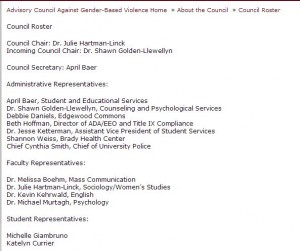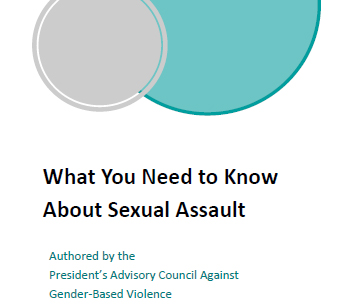Gender-Based Violence Council Undergoing Changes
Frostburg State University (FSU) is being investigated for a possible Title IX violation as a result of FSU alumnus Jerica Bennett filing a complaint to the U.S. Department of Education’s Office for Civil Rights. The Bottom Line published information relating to this case, prompting the university to write a letter to the editor.
The letter describes how the university is addressing sexual violence in the campus community, and it referenced the President’s Advisory Council Against Gender-Based Violence as one of the bodies working to address that problem. It must be stated that the faculty representatives on this council recently resigned.

Dr. Julie Hartman-Linck, Dr. Michael Murtagh, Dr. Melissa Boehm, and Dr. Kevin Kehrwald served on the council as faculty representatives. Their resignations came before the Title IX investigation began.
Dr. Shawn Golden-Llewellyn is listed on the council’s webpage as the new council chair.
The university hoped to fill the vacant positions before or at the beginning of the 2014-2015 academic year. FSU President Jonathan Gibralter will select the new representatives, according to Golden-Llewellyn.
According to a FSU spokesperson, “Two positions (one faculty, one student) have been filled, and [Dr. Golden-Llewellyn] anticipates that the rest will be filled by the next full council meeting in mid-October.” The spokesperson said that Dr. Dawn Armfield is the faculty representative for Women’s Studies and Gabrielle Atwell is one of the student representatives.
“Two at-large faculty positions, one position in Counseling Psychology, and two other student positions have yet to be filled, but all are in the process,” continued the spokesperson.
Former council chair Hartman-Linck explained that she stepped down to spend more time teaching. “I stepped down because I’ve been Chair of the Council for the last three years after initially agreeing to two years, so I was already in the position longer than I had originally planned,” she said, “As a professor at FSU, my main focus is on teaching, so spending a lot of time doing service work like chairing the Council, though valuable, is not where I would like to spend so much of my time.” She emphasized that she decided to resign in January 2013, before the investigation began.
When reached for comment, Boehm stated, “I have no comment.” Attempts to reach Murtagh and Kehrwald were unsuccessful.
Golden-Llewellyn stated, “Those members who gave rationale for their resignation indicated that, after serving for three years, they were interested in pursuing other projects and activities. Other members did not provide a reason for their resignations.”
Administrators and staff members who serve on the council include: Dr. Jesse Ketterman, Assistant Vice President of Student Services; April Baer, Student and Educational Services; Dr. Shawn Golden-Llewellyn, Counseling and Psychological Services; Debbie Daniels, Edgewood Commons; Beth Hoffman, Director of ADA/EEO and Title IX Compliance; Shannon Weiss, Brady Health Center; and Chief Cynthia Smith, Chief of University Police. Katelyn Currier serves as a student representative
Chief Smith reports to FSU President Jonathan Gibralter, and Hoffman reports to Kathy Snyder, vice president of human resources. The other council members ultimately report to Dr. Tom Bowling, vice president of student and educational services.
The council, which was created in 2011 to replace the Council Against Sexual Assault, is designed to “make recommendations to the President to assist in the campus-wide effort to educate students, faculty, and staff about the issue of gender-based violence and related programming, policies, and services,” according to its mission statement. “The Advisory Council will review policies and procedures and make recommendations in light of State and Federal expectations and best practices.”
Former and current members hope to see the council’s role expand.
According to Hartman-Linck, the mission to review university policy and procedure “was an area that I don’t think we had as much impact in the last three years as I would have wished for the Council. In the three years I was chair we discussed suggestions for areas where we might improve or clarify policy or procedure but these suggestions did not go further than discussions within the Advisory Council. I hope that is an area where there will be a more successful collaboration between the Council and other campus divisions in the future as the university moves forward and works to review policies and procedures in light of the issues that are coming up with the Title IX investigation and the changes in laws (including the new Campus SAVE Act).”
The Campus SAVE Act, a federal law enacted in March 2013, will require higher education institutions to “educate students, faculty, and staff on the prevention of rape, acquaintance rape, domestic violence, dating violence, sexual assault, and stalking,” according to its website. Starting October 1, 2014, the act will require schools to “report compliance with the Campus Save Act in their Annual Security Reports.”
Hartman-Linck added, “The Council is an advisory board and individual cases were not discussed at all at meetings so there was no input about specific cases or discussion of how they were to be handled. I actually was not even aware of Ms. Bennett’s case until reading about it in The Bottom Line since I am not on the list of people who is made aware of sexual assault cases at the university. Although the university needs to protect the confidentiality involved in reports of sexual assault I think it may be helpful in the future if the Council as a whole is more involved and aware in knowing about the issues that are coming up at our campus, including the number of cases reported each semester and the outcomes of those cases.”
Golden-Llewellyn hopes to increase communication between the council and the campus community. “I plan to continue working on open communication within [the council] and to the campus community,” she said. “I recognize the importance of considering the perspective of all members, and plan to balance that with the reality of progressing on our mission and goals as a Council.”
“Dr. Gibralter continues to make himself available to the Council and there are administrator/administrator appointee representatives on the PACAGBV. In this way, the administration has made itself available to provide feedback and help implement some of the goals of the Council. I look forward to maintaining that collaboration with the administration in the coming academic year,” she continued.
In the past, the council has played a prominent role in educating students, faculty, and staff about sexual violence. The council has also worked to reduce sexual violence in the community. The council’s greatest achievement is perhaps bringing the “Welcome to the Party” workshop to FSU. “Welcome to the Party,” which is shown to all FSU freshmen, is a “curriculum for sexual assault prevention,” according to its website.
FSU’s Safe Zone program, which works to “support students, faculty, and staff who identify as a Safe Zone advocate on behalf of the lesbian, gay, bisexual, transgender, and queer (LGBTQ) community,” is another program that the council helped bring to FSU.
The council will continue to play a prominent role in helping FSU to improve its handling of sexual assault cases, in addition to preventing sexual assault cases in the campus community.
A recent statement from FSU News and Media Services read, “Addressing sexual violence is a complex and challenging task. This is all the more reason that all in our campus community – starting with President Gibralter and campus leadership, but encompassing the President’s Advisory Council Against Gender-Based Violence, student affairs staff, committed student organizations and all faculty, staff and students – must continue to work together proactively on this issue.”
Dr. Amy Armiento, who previously served on the Council Against Sexual Assault and helped establish the President’s Advisory Council Against Gender-Based Violence, stated, “After attempting to work with the FSU administration since 2008, particularly the Office of Student and Educational Services, to make improvements to our handling of sexual assault cases on this campus, I am pleased to note that the university has acknowledged that it ‘can be better at addressing sexual violence and [is] working hard to meet the expectations of our students and community.’”
Armiento added that “So many faculty and staff want to see victims treated with the respect that they deserve after experiencing such life-altering violations, and I hope to see FSU become a proactive university rather than one of those universities that only exerts the minimum effort to meet the law’s wording. For that is not in the spirit of the law nor is it the right thing to do.”





1 Comment